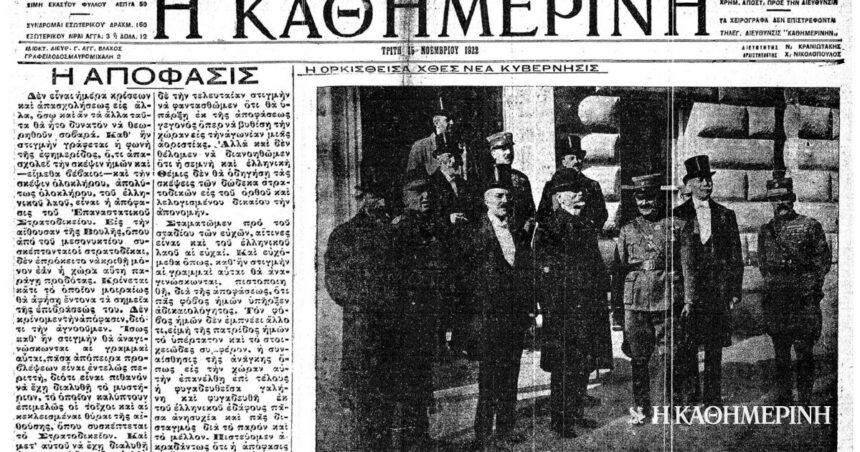The leaders of the revolutionary movement of September 1922 did not hide from the first moment their intention to punish those they themselves considered responsible for the defeat in Asia Minor. Immediately after their arrival in the capital, political figures, such as Dimitrios Gounaris, but also military personnel, such as Athanasios Fragou, were arrested. The arrests and rumors of possible execution prompted the intervention of foreign ambassadors, who recommended that a special regular court be held rather than a revolutionary one.
On October 6 (BC) the decision was taken to refer D. Gounaris, N. Stratos, P. Protopapadakis, X. Stratigos, M. Goudas, N. Theotokis, G. Baltatzis and G. Chatzanestis to trial. At the same time, the establishment of an investigative committee was announced. Initially, Emmanuel Zymvrakakis was appointed chairman of the investigative committee, but he resigned a little later on the grounds that he was being pressured by members of the Revolutionary Committee.
He was replaced by Theodoros Pagalos, who expedited the process and referred the defendants to an emergency military court accusing them of high treason.
The indictment was lengthy, “occupying an entire typewritten page” as “Kathimerini” wrote on October 18, 1922. The charges related to the conduct of the 1920 referendum on the return of Constantine I, changes in the army, decisions in the field of military operations during the Asia Minor Campaign, the assignment of the leadership of the armed forces to the king, the payment of compensation to persons who had suffered persecution by the Venizelians, the appointment of Hatzanesti as commander-in-chief, the renunciation of allied credits, the loss of North Epirou et al. It is noteworthy that even if the accusations were proven to be true, it did not follow that they were carried out with the intention of utter treason.
As G. Th. Mavrogordatos has pointed out (1915. The National Division, p. 153), the defendants were responsible for “irreparable damage to national interests […] from grave and inexcusable negligence and irresponsibility”.
The sessions of the Extraordinary Court Martial began on the morning of October 31st. Alexandros Othonaios was appointed President of the Military Court. Throughout the trial, the ambassadors of the foreign powers made sure to convey to the Greek side their objections to the possible execution of the accused. The intensity of these protests, however, decreased over the days. Even the British side, however, threatened to sever diplomatic relations if the accused were executed. Of course, this did not deter the Revolutionary Committee. Sotirios Krokidas was replaced as prime minister by Stylianos Gonatas on November 10. Five days later, on November 15, the Extraordinary Military Court concluded its work and announced its verdict. As reported by “Kathimerini” of November 16, 1922:
“At 6:30 in the morning, after the meeting of the Court, the Military Judges enter the hall and take their seats. In the midst of religious silence, Mr. President recites the decision of the Military Court, while the guards present weapons.
“In the name of the King of the Greeks, George II. The Extraordinary Revolutionary Military Court conceived according to Law. […] Kirissei impeaches the accused 1) Dimitrios Gounarin, 2) Nicole Stratton, 3) Petron Protopapadaki, 4) Nikolaon Theotokin, 5) Georgion Hatzanesti, 6) Xenophon Stratigon, 7) Michael Goudan and 8) Georgion Baltatzin. […]
“He unanimously condemns George Hatzanesti, Dimitrios Gounarin, Nikolaon Stratton, Petron Protopapadaki, Georgion Baltatzin and Nikolaon Theotokin to the death penalty. And Mich. Gouda and Xenophon Stratigon to the penalty of life bonds”.
The news of the execution provoked the reaction of the powerful European powers, who spoke of atrocities. The British ambassador, fulfilling his government’s warning, left Greece. Greek-British relations, however, were restored very quickly.
The execution of Ex is the most tragic manifestation of the National Divide, its peak but not its last phase. It temporarily eased the internal tension, which existed after the defeat in Asia Minor, the Catastrophe, the arrival of hundreds of thousands of refugees from Ionia and the loss of Eastern Thrace. He also brought discipline to the armed forces. The execution, however, greatly scarred the Crownless Republic of the Interwar period. The anti-Venizelian faction never forgot the “crime” of executing Ex.
The killing of its leadership scarred its politics during the interwar period. Retaliation came after the failed movement of the Venizelians, in March 1935. An Emergency Military Court sentenced An. Papoulas and Milt to death. Coimisis, who were key prosecution witnesses in the Trial of Ex.
Column Editor: Myrto Katsigera, Vassilis Minakakis, Antigoni-Despina Poimenidou, Athanasios Syroplakis









